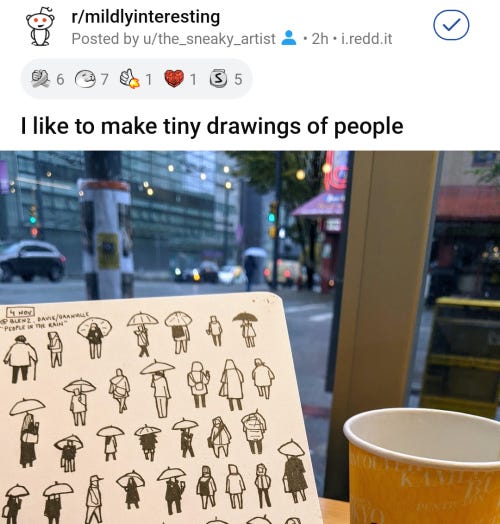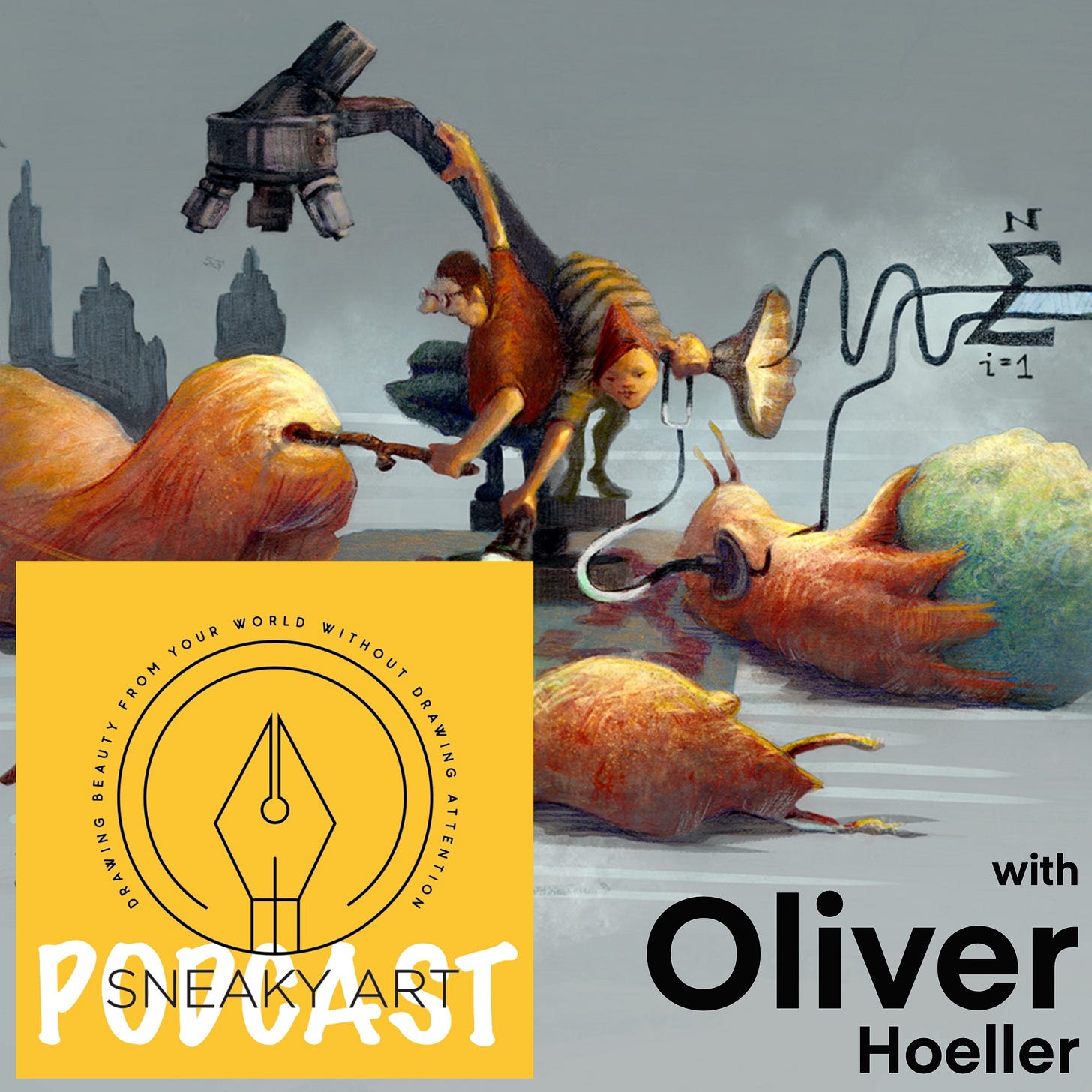77 - Illustrating for Science
💭 some good ideas from the new podcast episode + 🪔 happy diwali!
👋👋 Hello, new readers!
There are a lot of new readers after my viral Reddit post, so here’s a short selection of past issues to introduce you to my work -
[Insider Post #4] The story of TinyPeople
[#65] The importance of pushing against your comfort zone
[#64] The phenomenon of private bubbles in public spaces
[#55] Who is art for? Art is for everyone.
[#53] Ideas of existentialism and where TinyPeople fit into it.
[#51] Some answers to the question - “But why sneaky?”
Today I am sharing a new episode of the SneakyArt Podcast, some good ideas from the conversation, and special gifts to mark the festival of Diwali! 🪔
😛 Mr. Mildly Interesting
I went out to draw Tiny People yesterday, and posted the drawing to the subreddit r/mildlyinteresting. It’s the second time this year I’ve gone straight to the top of that subreddit. Does this make me the most mildly interesting artist of the year??

🎙 Ep 30 - Illustrating for Science with Oliver Hoeller
I speak with Vienna-based researcher and illustrator Oliver Hoeller about the field of science illustration, and what he finds in the practice of urban sketching to make him a better illustrator, a more patient observer, and a happier person.
He tells me about his path to a scientific career, and how he grabbed the opportunity to make his first science illustrations. We talk about where good ideas come from, and the ways an illustrator can build a mental library of reference material. We also speak about how he used observational drawing at a difficult time in his life to catalogue his memories and deal with adverse circumstances.
Check out Oliver's work on his website, or find him on Instagram.
Listen to our conversation on your choice of streaming service, or use a link below:
Spotify | Apple | PocketCasts | Google | Web | Gaana
📢 Join the Listening Party!
With every new episode, I host a listening party on the SneakyArt Discord channel. We listen to the conversation together and share ideas, thoughts and questions in real-time.
If that sounds like fun (hint: it is), join us!
🗨 What do words mean?
I asked Oliver about how he comes up with ideas for his illustrations. Here’s what he said -
"In my case it comes from 2 very different worlds - one is the world of words, certain phrases that are in the text, what they might mean and other ways to construe that. The other world that feeds into my illustration is directly from images, perhaps even that I draw. I might start with a word which grows into something else. By drawing that initial idea, something might suggest itself that I wasn't aware of before..." - Oliver.
I told him about something I had learned about the French philosopher Jacques Derrida, while listening to the Philosophize This podcast.
“There is nothing outside the text.” - Derrida.
Words are generative, i.e. understanding the meaning of one word requires other words.
How we express ourselves, how we describe an event, or how we tell a story, all of it is mediated and affected by language. Our entire experience as human beings, says Derrida, is bound to our words and language, because that is the only way we have to explain it, even to ourselves. Thus, there is nothing outside the text.
But at the same time, words are perilous. They are understood differently by different people. Derrida said that all words have two kinds of meanings - synchronic and diachronic. The synchronic meaning of a word is its most recent meaning, in current place and time. Its diachronic meaning is the long trail of different meanings attached to that word throughout history, as understood by different people in different places.
Two people might use the same words for the same thing and mean completely different things! For example, consider any politically loaded word - liberal, socialism, fascism, justice, etc.
It turns out words are very bad at meaning things. Words are not good at being … words. So,
“Every statement is a lie.” - Derrida.
As you can see, Derrida liked his outrage. He was a kind of intellectual arsonist. I wrote about this quote in more detail on my blog.
🕰 The Order of Time
Time was a consistent theme in my conversation with Oliver. He chuckled at reconstructing a ‘grand narrative’ of his life when I asked how he became a scientist and then an illustrator. We touched upon the subject again when he spoke about using observational drawing to make sense of sudden, adverse circumstances in his life.
"All these diary entries and drawings help you to construct a narrative…. We always construct a narrative. We only make meaning looking back on things." - Oliver.
I cited one of my favourite books of the year - Order of Time - by theoretical physicist Carlo Rovelli. As a researcher of quantum gravity, he wrote about the human inability to properly understand time.
The past, he says, does not actually exist. What exists is a narrative, a reconstruction of the past in our mind, created afresh every time we ‘look back’. The past is always reconstructed and reinterpreted, depending on who we are at that moment, and how we feel. It reminds me of a quote by the ancient Greek philosopher Heraclitus -
“No man ever steps in the same river twice. For it is no longer the same river, and he is not the same man.”
‘Order of Time’ affected me in profound ways and I have written about it in past newsletters. In #36, I shared a drawing made at the shore of False Creek, with a poem inspired by its ideas of infinity. In #37, I wrote a short ramble on the peculiarities of time.
🪔 Happy Diwali!
Diwali in India is the festival of lights. All over the country, lamps are lit, homes are decorated, and firecrackers are burst in celebration of Lord Rama’s victory over the demon-king Ravana, and his triumphant return from exile. The story goes that he was returning on a moonless night, so lamps were lit to guide his way home.
Sweets and gifts are an essential part of the celebration. Since I can’t give you sweets, I have some gifts instead!
🎁 Insider #8 - Post-Script conversation with Koosje Koene
Last week’s subscriber-only post was a post-script conversation with YouTuber, artist, and educator Koosje Koene. We spoke for ~40 minutes about working as solo creative entrepreneurs, and compared traditional and independent publishing. We also discuss answers to a fascinating question posed by Danny Gregory - “Why would you even want to publish a book?”
(Danny Gregory is himself author of many, many books, and was my guest in Episode 20 of the Podcast.)
This enriching and illuminating conversation is my first Diwali gift to you, as I am making it free to listen this week!
🎁 Subscription Offer!
Subscriptions support my work as an independent creative. They give me the mandate to chase after all the things that make me curious, to refine raw ideas, and to share them with readers. They make me a better thinker, writer, and artist. Thank you, SneakyArt Insiders!
My second Diwali gift is a discounted offer on my annual subscriptions. In return for your support, you would get access to all the exclusive content I make - bonus segments from the podcast, draft-passages from my next book, and opportunities to win free books and prints of my work!
If you like my work, this is the best way to support it. If you like my work, this is the best way to get some more every week. Grab the Diwali discount and become an Insider!
I am glad for your time and attention. Thank you for reading, and see you next week!






Happy Diwali! Every year, my mom calls to remind me to light candles and leave on a light, and I do.
"Mildy interesting" seems perfect for a sneaky artist. It gets you in the door but doesn't attract a lot of attention. 😉 And it beats "Oh, I didn't know you did anything creative." Or "What was your name again?" 🤣
Congratulations on going viral.